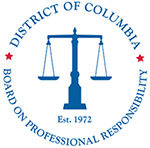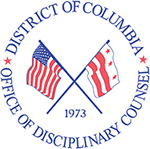Search Disciplinary Decisions by
Attorney Name
Search Disciplinary Decisions by
Date Range
Search Disciplinary Decisions by
Keyword
Quinne Harris-Lindsey
Docket No. 15-BD-042
Decisions
Informal Admonition (December 11, 2020)
Summary: In re Quinne Harris-Lindsey. Bar No. 451238. December 11, 2020. The D.C. Court of Appeals directed Disciplinary Counsel to issue Harris-Lindsey an informal admonition for her failure to keep complete records of third-party funds. The court held (with one judge dissenting) that a lawyer is entrusted with client or third-party funds when she is imbued with authority to prevent their unauthorized use, and that “unauthorized use” can be established by proving either that the client did not consent to the attorney’s use of the funds or that assets were accessed without prior approval by a court. If the lawyer fails to exercise her authority to prevent the unauthorized use of client or third-party funds, a finding of misappropriation may lie. Because the court had not previously found funds to be entrusted when co-signatures were required, the holding that this may constitute misappropriation is prospective only. This matter arises out of Harris-Lindsey’s conduct during the representation of her cousin, who had been appointed guardian of her child’s estate. Harris-Lindsey and her client signed checks paying her legal fees without court permission. Harris-Lindsey also failed to maintain the complete estate account because a number of relevant documents were lost in an office move. (Rule 1.15(a) and (former) D.C. Bar Rule XI, § 19(f) (record-keeping requirements).)
DCCA Opinion (December 10, 2020)
Summary: In re Quinne Harris-Lindsey. Bar No. 451238. December 10, 2020. The D.C. Court of Appeals directed Disciplinary Counsel to issue Harris-Lindsey an informal admonition for her failure to keep complete records of third-party funds. The court held (with one judge dissenting) that a lawyer is entrusted with client or third-party funds when she is imbued with authority to prevent their unauthorized use, and that “unauthorized use” can be established by proving either that the client did not consent to the attorney’s use of the funds or that assets were accessed without prior approval by a court. If the lawyer fails to exercise her authority to prevent the unauthorized use of client or third-party funds, a finding of misappropriation may lie. Because the court had not previously found funds to be entrusted when co-signatures were required, the holding that this may constitute misappropriation is prospective only. This matter arises out of Harris-Lindsey’s conduct during the representation of her cousin, who had been appointed guardian of her child’s estate. Harris-Lindsey and her client signed checks paying her legal fees without court permission. Harris-Lindsey also failed to maintain the complete estate account because a number of relevant documents were lost in an office move. (Rule 1.15(a) and (former) D.C. Bar Rule XI, § 19(f) (record-keeping requirements).)
Board Report and Orders (July 28, 2017)
Summary: This matter arises out of Harris-Lindsey’s conduct during her representation of her cousin, who had been appointed as guardian of her child’s estate. The Board unanimously adopted the Hearing Committees finding of a recordkeeping violation (D.C. Bar R. XI, section 19(f)) but reached no majority position as to sanction. Three members of the Board recommend an informal admonition for Harris-Lindsey’s recordkeeping violation; two members of the Board found Harris-Lindsey’s conduct also violated Rule 8.4(d) (serious interference with the administration of justice) and recommend a public censure; and two members of the Board found Harris-Lindsey engaged in reckless misappropriation (Rule 1.15(a)) and recommend disbarment.
Hearing Committee Report (June 2, 2016)
Summary: Not yet available.
To search for additional disciplinary cases involving this attorney, click here

- Board on Professional Responsibility
- 430 E Street NW
- Suite 138
- Washington, DC 20001
- Phone: 202-638-4290
- Fax:

- Office of Disciplinary Counsel
- District of Columbia Court of Appeals
- 515 5th Street, NW
- Building A, Suite 117, Washington, DC 20001
- Phone: 202-638-1501
- Fax: 202-638-0862


